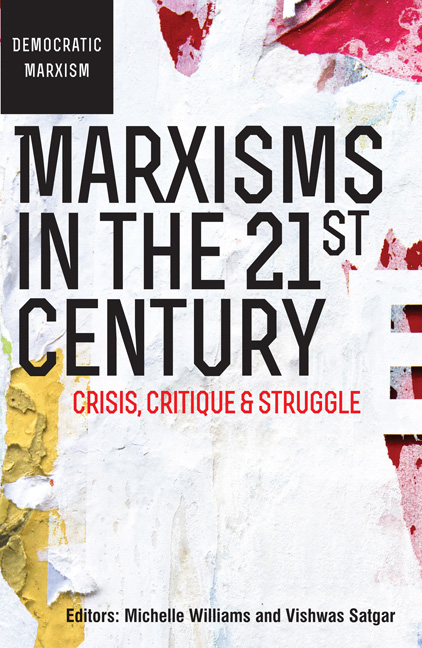Book contents
- Frontmatter
- Miscellaneous Frontmatter
- Acknowledgements
- Contents
- Acronyms and Abbreviations
- Introduction
- PART ONE DEMOCRATISING AND GLOBALISING MARXISM
- Chapter 1 Marxism and Democracy: Liberal, Vanguard or Direct?
- Chapter 2 Marxism after Polanyi
- Chapter 3 Transnationalising Gramscian Marxism
- PART TWO MARXISM AND LEFT POLITICS
- PART THREE CRISES OF MARXISM IN AFRICA AND POSSIBILITIES FOR THE FUTURE
- Conclusion
- Contributors
- Index
Chapter 1 - Marxism and Democracy: Liberal, Vanguard or Direct?
from PART ONE - DEMOCRATISING AND GLOBALISING MARXISM
Published online by Cambridge University Press: 21 April 2018
- Frontmatter
- Miscellaneous Frontmatter
- Acknowledgements
- Contents
- Acronyms and Abbreviations
- Introduction
- PART ONE DEMOCRATISING AND GLOBALISING MARXISM
- Chapter 1 Marxism and Democracy: Liberal, Vanguard or Direct?
- Chapter 2 Marxism after Polanyi
- Chapter 3 Transnationalising Gramscian Marxism
- PART TWO MARXISM AND LEFT POLITICS
- PART THREE CRISES OF MARXISM IN AFRICA AND POSSIBILITIES FOR THE FUTURE
- Conclusion
- Contributors
- Index
Summary
One of the most contentious and neglected issues in Marxism is the content, role and place of democracy in transformative visions and practices. For some, Marxism is antithetical to democracy; for others, vanguard democracy represents the pinnacle of Marxism, and still others pay little attention to democracy at all. Marxism has gone through different phases, each phase with its unique social base and foundational ideas. At the time of the Second and Third Internationals, Marxism's social base was largely in working-class movements and parties, but shifted from the 1950s onwards to intellectuals overwhelmingly located in universities. This growth of and engagement with Marxism among intellectuals was in part due to the phenomenal growth and influence of university education (Hobsbawm 2011: 360). After reaching the peak of its influence in the academy during the 1970s, Marxism weakened through the course of the 1990s. In the late 1990s, however, a renewed interest in Marxism emerged among multi-class movements, middle- and working-class activists and intellectuals. These diverse social strata do not necessarily converge in their understandings of history, or their views of the causes and consequences of the dynamics of capitalism, but rather, share in their belief that ‘another world is possible’.
This is the context within which I focus this chapter on literature – both liberal and Marxist – that has explicitly engaged the issue of democracy. Because Marxist influence over the last half-century has largely emanated from intellectuals located within universities, I focus on the various ways in which liberal and Marxist scholars have placed democracy against and within Marxism. While democracy is a contested concept that often incorporates very different notions of social change and control, with various actors and processes, twentiethcentury liberals and Marxists tended to focus on representative and vanguard democracy respectively, largely ignoring the importance of direct and participatory democracy. Bertrand Russell (1946: 14) pithily captured the central distinction: the Western understanding of democracy ‘is that it consists in the rule of the majority; the Russian view is that it consists in the interests of the majority’. Neither tradition emphasised government by the people. The bifurcation of democracy into representative democracy versus vanguard democracy severely limited the debate on democracy in the twentieth century.
- Type
- Chapter
- Information
- Marxisms in the 21st CenturyCrisis, Critique & Struggle, pp. 16 - 33Publisher: Wits University PressPrint publication year: 2013



